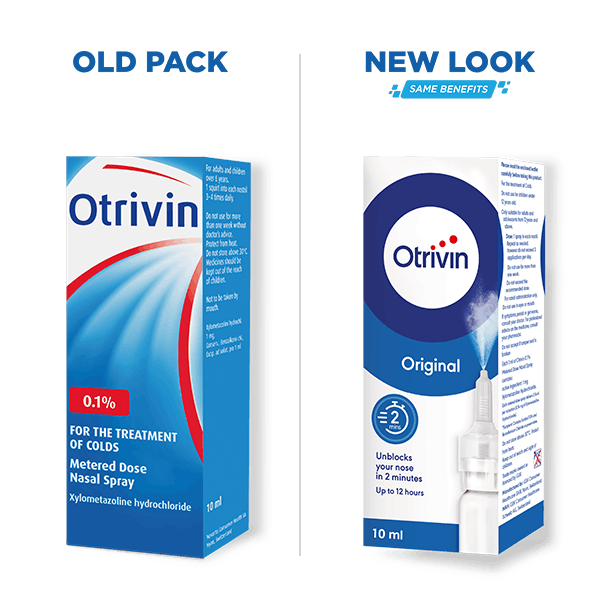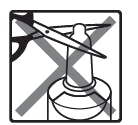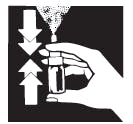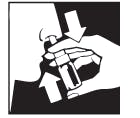When to use
Not to be used for Children under 12 years of age. Only for adults and adolescents from 12 years and over. Otrivin 0.1% Metered Dose Nasal Spray is indicated for the symptomatic treatment of nasal congestion.
Precautions
Talk to your doctor or pharmacist before using Otrivin if:
- You have high blood pressure.
- You suffer from a heart disease.
- You have an overactive thyroid gland (hyperthyroidism).
- You suffer from diabetes.
- You have an enlarged prostate gland (prostatic hypertrophy).
- You have a benign tumour of the adrenal gland that produces high amounts of adrenaline and noradrenaline (pheochromocytoma).
- You are being treated with some antidepressants known as monoamine oxidase inhibitors (MAOIs) or if you have used them within the previous 2 weeks.
If any of the above apply,do not use Otrivin before talking to your doctor or pharmacist.
- Like other products for the relief of blocked nose, Otrivin may give rise to sleep disturbances, dizziness, tremor in very sensitive patients. Consult your doctor if such signs prove troublesome.
- Like other nasal decongestants, Otrivin should not be used for more than 7 consecutive days. If symptoms persist, consult your doctor. Prolonged or excessive use may cause stuffiness in the nose to return or worsen.
- Otrivin is not intended for use in the eyes or mouth.
- Do not exceed the recommended dosage, especially in children and in the elderly.
- Otrivin 0.1% metered dose spray should not be used for children below 12 years of age.
- This product contains Sodium to be taken into consideration by patients on controlled Sodium diet.
- Contact your doctor if you have an intolerance to some sugars.
- Otrivin should not be used during pregnancy.
- The use of Otrivin while breast-feeding should only take place on the instructions of a doctor.
Further information
Keep out of reach of children. Seek medical advice before using if you are breastfeeding. Do not use after the expiry date stated on the bottle.
Always read the patient information leaflet.
Like all medicines, Otrivin can cause side effects, although not everybody gets them.
STOP using Otrivin and seek medical help immediately if you have any of the following which may be signs of an allergic reaction:
- Difficulty breathing or swallowing.
- Swelling of the face, lips, tongue or throat.
- Severe itching of the skin, with a red rash or raised bumps.
- Irregular Heartbeat.
Common side effects (may affect up to 1 in 10 people):
Dryness or irritation of the nasal mucosa, nausea, headache, local burning sensation.
Very rare side effects (may affect less than 1 in every 10,000 people):
Allergic reactions (skin rash, itching), blurred vision, irregular or fast heartbeat, drug-induced swelling of the nasal mucosa (rhinitis medicamentosa).
If any of the side effects gets serious or if you notice any other side effects not listed in this leaflet, please tell your doctor or pharmacist.
How to Store Otrivin?
Do not use this medicine after the expiry date which is stated on the carton, label.
The expiry date refers to the last day of that month. This date applies even if the packaging has been opened.
Don’t store above 30°C. Protect from Heat.
Medicinal products should be kept out of the reach and sight of children.
* Medicines should not be disposed of via wastewater or household waste. Ask your pharmacist how to dispose of medicines no longer required. These measures will help to protect the environment.
Tell your doctor or pharmacist if you are taking, have recently taken or might take any other medicines. In particular, you should not use Otrivin if you are taking:
* Certain medicines used for treatment of depression. These medicines are:
- Monoamine oxidase inhibitors (MAOI): do NOT use Otrivin if you are taking or have been taking MAOIs within the last 14 days.
- Tri-cyclic and tetra-cyclic antidepressants.
* Potentially hypertensive medicines or medicines for Parkinson’s disease (levodopa).
If you use any of the above medicines, consult a doctor before using Otrivin.
Do not use Otrivin if:
- You are allergic to xylometazoline or any other ingredients of this medicine.
- You have undergone recent trans-nasal surgery (brain surgery where the operation was carried out through the nose or mouth).
- You have narrow angle glaucoma (increased pressure in eyes).
- You have chronic nasal inflammation with very dry nasal passages (rhinitis sicca or atrophic rhinitis).










